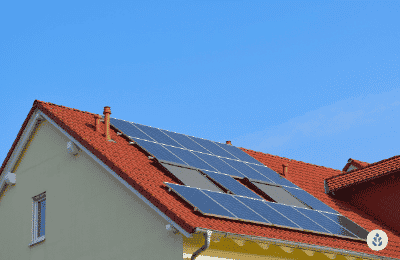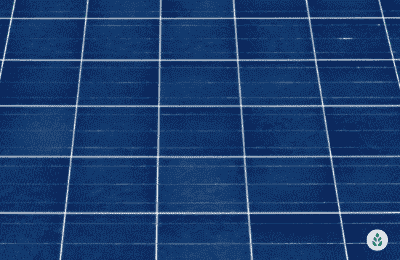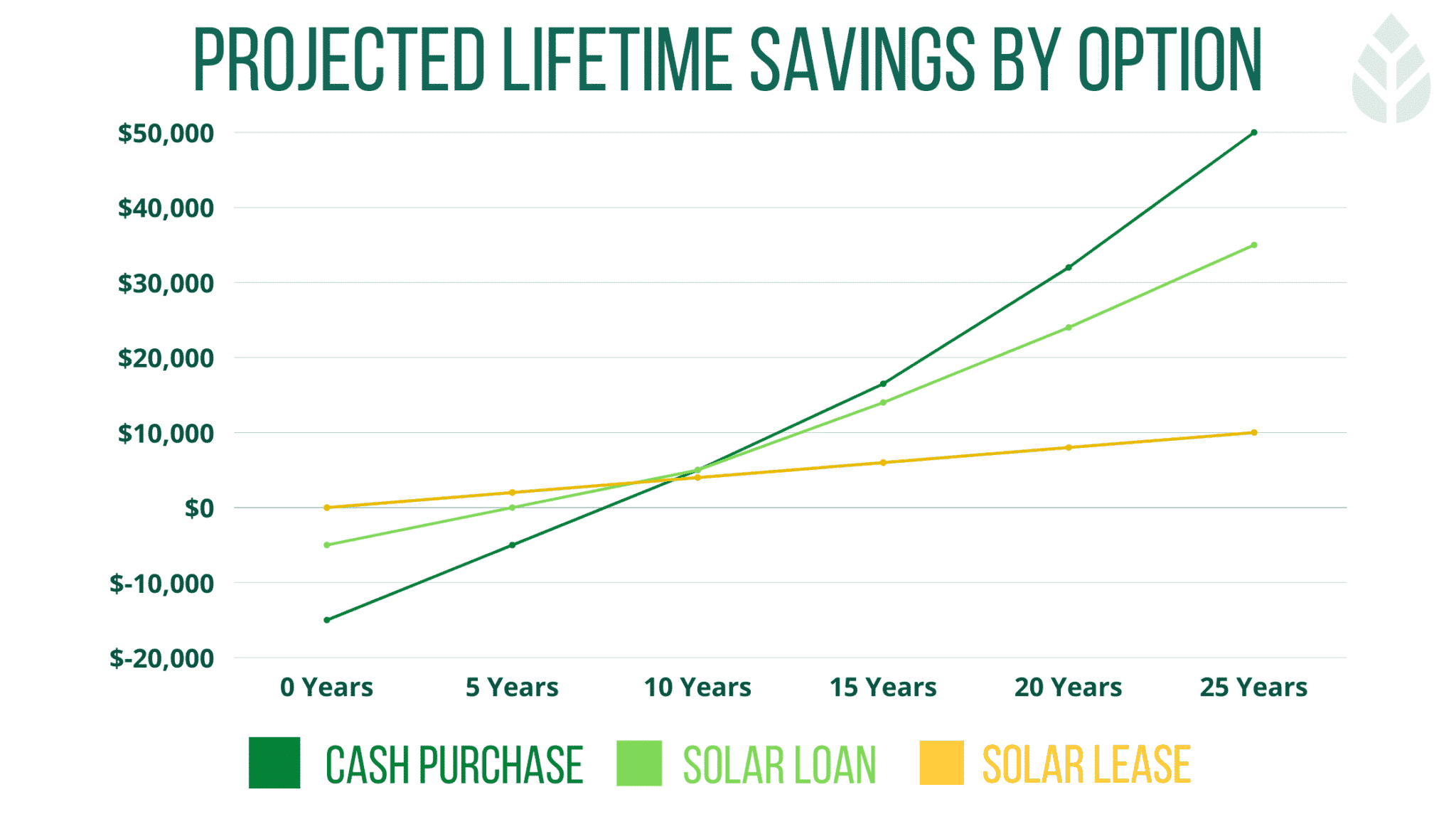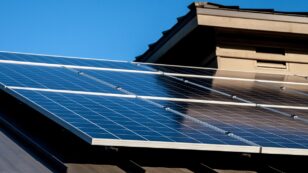
Is Solar Worth It in Virginia? (2024 Homeowner's Guide)
In this guide, you’ll learn:
- How can Virginia homeowners determine if solar is worth it?
- What are the main benefits of solar panels in Virginia?
- What should Virginia homeowners look out for when going solar?
Each product and or company featured here has been independently selected by the writer. You can learn more about our review methodology here. If you make a purchase using the links included, we may earn commission.
Is Virginia Good for Solar Energy?
Virginia ranks 9th in the country for solar installations, but many homeowners in the area question the value of solar because electricity rates are below the national average and solar equipment is more pricy in Virginia than in most states. Overall, solar is considered a great investment for most Virginia residents, but it won’t save every homeowner money.
Below, we’ll discuss the different metrics you can use to determine if solar is a good option for your home. We’ll also explain the benefits of converting to solar, and we’ll go over some things you need to know before you commit to this renewable energy source.

Blue Raven Solar
Pros
- Industry-leading in-house financing
- Competitive pricing
- Excellent reputation
Cons
- Doesn't offer solar batteries (coming 2022)

Blue Raven Solar
Pros
- Industry-leading in-house financing
- Competitive pricing
- Excellent reputation
Cons
- Doesn't offer solar batteries (coming 2022)
Watch Below: Is Going Solar Worth It?
How Can You Figure Out if Solar Panels are Worth It in Virginia?
As mentioned above, solar panels are a worthwhile investment that will provide a significant return on investment (ROI) for most Virginia residents, but they aren’t ideal for every home. We’ll discuss some of the things you can assess about your property to determine if you’d benefit from solar.
- Your home’s energy use
- Cost of going solar in Virginia
- Average payback period in Virginia
- Average buy-back rates in Virginia
- Your roof’s exposure to the sun
- Solar outlook in Virginia
Your Home’s Electricity Consumption
First, you should consider your average monthly energy expenditure.
The biggest advantage of solar panels is that they offset your electric bills, so the more power you use, the more you stand to save. Generally speaking, most homes that use more than 500 kWh per month are considered good candidates for solar panels.
The average Virginian consumes around 1,095 kWh monthly, which means solar panels, in general, are quite valuable. The power consumption in Virginia is also above the national average, which means solar conversion is a better option in Virginia than in many other states, at least from an energy consumption perspective. You can check your monthly energy usage on your past electric bills.
Cost of Going Solar in Virginia
The price of solar panels in Virginia usually sits around $3.35 per watt, which is slightly higher than the national average of $3.33. Virginians require an average system size of 11 kW, which puts the total price at approximately $25,795 after the federal tax credit is taken into consideration.
Solar panels are considered more valuable where they can offset more of your energy bills, which means areas where electricity rates or energy consumption are high are the best for solar conversion. Virginia sits below the average for electricity rates but well above the average for consumption, which means Virginia solar panels are a bit more valuable than they are in most other states.
Average Solar Payback Period in Virginia
Solar panel systems usually pay for themselves by providing you with energy savings that add up to more than the system expense over time.
The average solar panel payback period in Virginia is around 12 years, which is right in line with the national average. The standard range for this payback period in Virginia is between 9 and 15 years.
Your payback period can be estimated using a solar calculator or more accurately by a solar installer. If yours is longer than 15 years, your solar system will provide a lower ROI.
The closer your payback period is to the expected lifespan of your photovoltaic (PV) equipment — an average of around 25 years — the smaller your return will be. You’ll have to weigh the estimated return with your system expense to determine if going solar is worth it for you.
Average Solar Buy-Back Rates in Virginia
Net metering is a policy that is mandated in most states now, and it requires local utility companies to buy back excess energy you produce with your system for a credit to your electric bills.
Net metering programs are mandated by Virginia’s Public Utility Commission, but the companies aren’t required to buy back electricity at the retail rate. As such, most will use an avoided-cost rate, which is less appealing overall, although still helpful.
You should check with your utility provider before committing to solar, as policies will vary between electric companies. Dominion Energy, for example, currently offers the full retail rate, while most companies don’t.
If you have a policy that is less than ideal, you might need to install a solar battery alongside your panels to help offset or even eliminate your electric bills.
Your Roof’s Exposure to the Sun
Solar panels only produce electricity when they absorb sunlight, so the more sun exposure your roof has, the more value your panels will provide.
Virginia is considered average when it comes to sun exposure, with its approximately 205 sunny days per year matching the national average exactly. Generally speaking, Virginia receives ample sunlight to make solar conversion a worthwhile investment.
However, some homes in Virginia won’t be suitable for solar panels, so there are additional considerations to make on a case-by-case basis. For example, the direction your roof faces has a significant impact on solar production, with south-facing and west-facing roofs being the best options in the US.
Shading on your roof can also reduce the value of your solar PV system, so homes without heavy tree coverage or nearby buildings are generally the best.
Solar Outlook in Virginia
Virginia still heavily relies on fossil fuels for its energy, with over 60% of all production coming from natural gas alone.3 With that being said, there are still financial incentives in place for utility companies that promote the use of natural gas.
When it comes to clean energy sources, biomass leads the way. With that being said, the solar market in Virginia has grown significantly over the past decade, with utility-scale solar, in particular, becoming far more prevalent than ever before. The solar industry is expected to continue to grow in The Old Dominion, which should make solar equipment more affordable and accessible.
The state passed the Clean Economy Act to promote solar, and the state incentives for solar energy are quite appealing. Overall, solar is well-supported and accepted in Virginia.
What Are the 4 Main Benefits of Solar Energy in Virginia?
Virginia homeowners who convert their homes to solar power will enjoy quite a few benefits that make going solar far more appealing. We’ll discuss the most significant upsides to installing solar panels in Virginia below.
- Electricity bill savings
- Lower taxes and access to other incentives
- Increased home value
- Eco-friendly
Electricity Bill Savings
The most appealing benefit for most homeowners will be the reduction on their energy bills. Solar panels produce electricity for your home, which lets you purchase less from your utility company. The average Virginian pays around $153.08 per month for electricity, making it one of the most expensive states for energy in the country.
If you can eliminate your electric bills — with a retail-rate net metering policy or a solar storage solution — you could save around $1,836 every year by converting to solar. The average Virginia resident pays off their system using the energy savings it provides in around 12 years, and the remaining 13+ years of system life provide additional savings totaling around $30,832.
You will also essentially lock in a lower electricity rate by going solar, which means your savings could be even more substantial if energy rates continue to go up.
Lower Taxes & Access to Other Incentives
Virginia is considered quite the solar-friendly state, and that’s partly because of the solar incentives offered by the state and federal governments.
One of the best solar incentives available is the federal solar tax credit (ITC). The ITC is for 30% of your total system expense, which averages around $11,055 in VA. This amount gets credited to your federal income tax liability for the year your system is installed and connected to the electric grid.
Some additional Virginia solar incentives are explained briefly below:
- Net Metering: Net metering is a billing policy that lets solar customers offset or even eliminate their energy bills by overproducing power with their PV equipment and selling it back to their utility companies. Net metering is mandated in Virginia, although the buy-back rate varies among electric companies.
- Solar Renewable Energy Credits (SRECs): SRECs are credits you earn for every 1,000 kilowatt-hours (1 megawatt-hour) you produce with your panels. You can then sell the SRECs for a profit on the SREC market.
- Residential Property Tax Exemption for Solar: This is a property tax exemption that stops your property taxes from going up after installing solar. Under normal circumstances, home improvements that boost your home value also drive up your taxes. Residential solar panels do make your home more valuable, which we’ll discuss below, but this exemption prevents your taxes from being affected.
Home Resale Value Increase
Solar panels cause your home value to go up, which is another massive benefit of installing a solar energy system in your home.
Estimates from Zillow state that the average value bump from going solar in the US is around 4.1%.4 Given the average property value of $372,801, most Virginians will experience a value increase of around $15,284.5
While using cash or a solar loan to purchase your solar panels will provide this benefit, solar leases and power purchase agreements (PPAs) will not. This is one of several downsides to opting for a solar lease or PPA.
Clean, Renewable Energy
Virginia is considered a fairly eco-friendly state, so many homeowners will also be interested in the environmental benefits enjoyed when going solar. Installing solar panels means you’ll improve your energy independence, reduce your carbon footprint, and help ease pollution and global warming. You will also be less reliant on your power company, which means you can avoid price hikes, which are expected in the future.
What Should Virginians Look Out For When Considering Solar?
Even after you consider all of the metrics to determine if your home is a good fit for solar, you’ll have quite a few things to think about before committing to solar power. We’ll discuss some additional considerations below.
Upfront Fees
The upfront fees of solar are quite high, despite the fact that solar panels pay for themselves in most cases. Some homeowners find that prices are prohibitively high, especially in areas like Virginia, where the per-watt price for panels is above the national average.
One of the best ways to keep upfront fees down is to use a solar financing option that requires a minimal down payment. You can also avoid solar batteries and other add-on products and choose a cheaper solar panel brand.
Payback Period
Your estimated solar panel payback period is important for determining your solar viability because it simultaneously assesses your home for multiple metrics, including system size, system expense, shading on your roof and more. The payback period can also determine your estimated ROI.
The average payback period in Virginia is 12 years, but anywhere between 9 and 15 years is considered normal. If your timeline is longer, it will take more time to recuperate your investment, ultimately leading to fewer savings in the long run.
Net Metering Policies in Virginia
Net metering is a wonderful billing option for solar customers that lets overproduction offset future utility bills. The net metering policy varies between electric providers, with some offering a less appealing avoided-cost rate and others — like Dominion Energy — offering retail rates.
The policy available isn’t usually a make-or-break factor, but customers with a less-than-ideal policy often want to add a solar battery to their system to maximize savings. You should check with your electric company before committing to solar.
Pending Policies & Changes to Incentives
The solar industry is still in the process of changing and expanding, even in states like Virginia, where it seems relatively well established. New solar rebate programs could pop up, existing incentives can expire and current policies can change. Waiting for better incentives to become available isn’t usually a wise decision, but you should check for updates before signing anything.
Weather & Climate in Virginia
Some residents in Virginia worry that the somewhat northern location of the state and the frequent cloudy weather will make solar less valuable overall.
Virginia receives around 205 sunny days per year, which is the national average. Although the sunlight won’t be quite as intense here as it will nearer the equator, the sunlight that is available is often plenty to make solar a good option in The Old Dominion.
Another valid concern in Virginia is the extreme weather, including hurricanes, tropical storms and heavy rain. Strong winds can damage your panels, but a good warranty from your installer should be plenty to keep you and your home protected. The above-average rainfall in VA will just serve to keep your panels clean, which can help maximize efficiency throughout the year.
Companies Pushing Solar Leases or PPAs
The final consideration you need to make is regarding the solar panel installation company you want to complete your home solar project installation. Unfortunately, there are some companies out there that are in the industry just to turn a profit.
They often use marketing schemes like “free panels,” which are never really free, or they use aggressive sales tactics to push solar leases. Solar leases should generally be avoided, as they don’t let you take the federal tax credit, they don’t increase home value and they provide a much smaller — if any — ROI than solar loans and cash purchases.
Unfortunately, there have been news reports from NBC Washington about disingenuous solar companies in Virginia who take down payments of thousands of dollars and never actually install the system.6 There have also been reports from Virginia residents about solar panel companies posing as reps from utility companies and over-promising rebates and incentives to get them to sign solar leases.
It’s always best to work with a vetted and reputable solar installer to avoid falling victim to solar scams.
So, Will Solar Be Worth It For Your Virginia Home?
For most Virginians, installing solar panels is an outstanding investment that provides a massive ROI and a slew of appealing benefits.
However, solar isn’t right for every home, so you need to determine your solar viability before you dive into installing panels on your property. Some things to remember to consider include your monthly energy bills, your system size requirements and installation fee, the direction your roof faces, and more.
We suggest connecting with an experienced solar installer in your area to help you determine if converting to solar is right for your home and budget.
See also: Find out how much solar power your roof can produce with our solar calculator
Read More About Going Solar
- What Are the Most Reliable Solar Companies in Virginia?
- What Solar Incentives Are Available in Virginia?
- Find Cost Savings on Solar in Virginia
- Homeowner’s Guide to Solar Panels in Virginia
The cost information presented in this article is derived from a comprehensive analysis, incorporating data from multiple industry sources. The average cost per watt per state was calculated based on figures from Consumer Affairs, Energy Sage, and Berkeley Lab’s Electricity Markets & Policy Department. Additionally, monthly energy consumption and the average monthly cost of electricity were sourced from the U.S. Energy Information Administration, ensuring a well-rounded and accurate representation of the information presented.
Frequently Asked Questions
At EcoWatch, we routinely get questions from homeowners in Virginia about how to determine if they will benefit from solar panels. Below are some of the questions we see most often, along with our responses. If you have specific questions that aren’t answered here, reach out to our team of solar experts at solar@ecowatch.com.
Most Virginia residents find that their systems pay for themselves in energy savings in between 9 and 15 years, with an average solar panel payback period of about 12 years. However, your payback period can fall outside that range based on a number of factors. These include your energy needs, how energy-efficient your home is, the size of the system you need to offset electric bills, the price of solar panels for your specific home and roof size, the net metering policy offered by your electric company, and more. You can use a solar calculator to estimate your payback period or have a solar installer in your area calculate the time frame for you.
In most cases, yes! The average Virginian pays around $25,795 for their solar PV system after the 30% federal tax credit. This same amount is enjoyed in energy savings in the first 12 years, after which the remaining 13+ years of system life should continue to provide savings. Most homeowners in Virginia end up saving a massive $30,832 after the panels have paid for themselves.
Yes, installing solar panels on your home will boost the property value. Research from Zillow suggests that solar bumps up home value by around 4.1%, which averages out to $15,284 in Virginia.
Yes, permits are required for solar panel installation in Virginia. In most cases, your solar installer will handle pulling and closing the permits for you so that you don’t have to deal with your permitting agency. The permit expenses are usually included in your total system estimate.
You can DIY solar panel installation in Virginia, but we don’t recommend it. Installing a rooftop solar system is dangerous. You’ll not only put your home and panels at risk of damage, but you’ll also put yourself at risk of serious injury. Although it will be a bit more expensive than doing the work yourself, it’s usually a better idea to leave the work to an experienced professional.
Top Solar Installers In Virginia Cities
Comparing authorized solar partners
-
- Industry-leading in-house financing
- Competitive pricing
- Excellent reputation
- Doesn't offer solar batteries (coming 2022)
A+Best Solar Financing2014Trina Solar, Canadian Solar, SolarEdge, Silfab, SunPower25-year manufacturer warranty; 10-year workmanship warranty, 2-year production guarantee
Having trouble deciding? Click below and use our process to receive multiple quotes instead:

 233k
233k  41k
41k  Subscribe
Subscribe 








